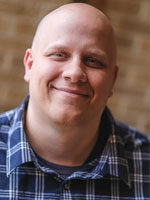Health Communication Certificate
Changing the Way We Communicate Health Issues
The University of Utah is the primary institution for educating health providers and ancillary professionals in the state of Utah. Health communication is a crucial concern and a top priority as the nature, forms, and functions of health care and health information shift dramatically in contemporary society.
Students earning the Health Communication Certificate respond to that increasing interest and demand for greater awareness and understanding of health communication. Specifically, the certificate program involves the study of how communication about health is co-created, transmitted, received, constructed, and circulated in various contexts.
The certificate is available for both undergraduate and graduate students who are current University of Utah students.
Learn More about the Program
Program Description
The Health Communication Certificate is an 18-credit-hour program offered by the Department of Communication. The University of Utah is the primary institution for educating health providers and ancillary professionals in the state of Utah.
Health communication is a crucial concern and currently a top priority for medical and health institutions and agencies, as the nature, forms, and functions of health care and health information shift dramatically in contemporary society. This certificate responds to that increasing interest and demand for greater awareness and understanding of health communication.
Multiple units and programs across the University include some emphasis on health communication in teaching, research, and service. However, prior to this certificate, there was no formal program for University audiences to gain and demonstrate qualifications and competencies in health communication.
Faculty in the Department of Communication created this certificate program to meet the needs of students, providers, and professionals across the institution and improve the overall quality of health communication in the state of Utah. Graduates face increasing competition for desirable jobs post-graduation. Accordingly, there is a clear need for the University of Utah to provide our students with opportunities to gain and demonstrate expertise in specialized areas. The Health Communication Certificate helps meet that need. The certificate is available for both undergraduate and graduate students who are currently University of Utah students.
For additional information and resources regarding the study and practices of health communication, visit the Coalition for Health Communication website.
Visit the Major Exploration Link
Requirements
The certificate will consist of 18 units divided into 3 tiers, as follows:
Tier 1
Complete the following course:
- COMM 5115/6115 – Foundations of Health Communication
Tier 2
Must complete three total courses
Complete at least one of the following courses:
- COMM 5117/6117 – Health Campaigns & Media
- COMM 5118/6118 – Health Literacy
- COMM 5815/6815 – Special Topics in Health Communication
Complete at least two of the following courses:
- COMM 3590 – Integrated Marketing Communication (avaiable for the undergraduate certificate only)
- COMM 5116/6116 – Health, Communication, and Culture
- COMM 5117/6117 – Health Campaigns & Media
- COMM 5118/6118 – Health Literacy
- COMM 5140/6140 – Communication and Aging
- COMM 5150/6150 - Dialogue and Community Engagement
- COMM 5200/6200 – Persuasion & Political Communication
- COMM 5365/6365 - Communicating Climate Change
- COMM 5370/6370 - Environmental Communication, Special Topics
- COMM 5490/6490 – Communication and Social Justice
- COMM 5640/6640 - Comm Technology and Culture
- COMM 5815/6815 – Special Topics in Health Communication
- COMM 5820/6820 - Science Communication, Special Topics
Tier 3
Choose two other health-related courses. Must pre-approve these courses with an academic advisor. One can come from Tier 2, but at least one must be from outside the Department of Communication.
Approved Courses:
- ECON 5190/6190 – Health Economics
- FCS 5180 – Autism Across the Lifespan
- FCS 5390 – Gender, Race, Sexualities
- FCS 5430 – Family and Healthcare Policy
- FCS 5630/6630 – Healthy Communities
- FCS 6465 – Stress, Development, and Health
- FPMD 4500 – Public Health: A Global Perspective
- FPMD 5005 – Introduction to the Medical Profession
- FPMD 5520 – Public Health Perspective on Surgery in the Global Context
- FPMD 5530 – Global Health
- FPMD 5540 – Refugees in Utah: A Public Health Issue
- GERON 5220 – Caregiving and Aging Families
- GERON 5370/6370 – Health and Optimal Aging (also HEDU 5370)
- H EDU 5060 – International Health Promotion
- H EDU 5100 – Health Care in the United States
- H EDU 5300 – Diversity and Health
- H EDU 6000 – Foundations and Theory of Health Promotion
- H EDU 6060 – Health Instruction and Communication
- NURS 6772 – Quality Improvement in Health Care
- PHIL 5370 – Philosophy of Biology
- PHIL 5520/6520 - Advanced Bioethics
- POLS 5321/6321 – Health Policy
- SOC 4674/6674 – Global Health
- SOC 5720/6720 – Medical Sociology
Learning Requirements
By completing the media studies minor, students will:
- Students understand theories and processes of the broad area of health communication as well as more focused choices.
- Have a broad understanding of approaches to health communication as well as more practical knowledge and competencies.
How to Apply
Students interested in the Health Communication Certificate must fill out the certificate declaration form. General questions about the certificate may be sent to the Program Coordinator, Dr. Andy King, at andy.king@utah.edu. Specific questions about the certificate enrollment process can be sent to comm-advisor@utah.edu.


